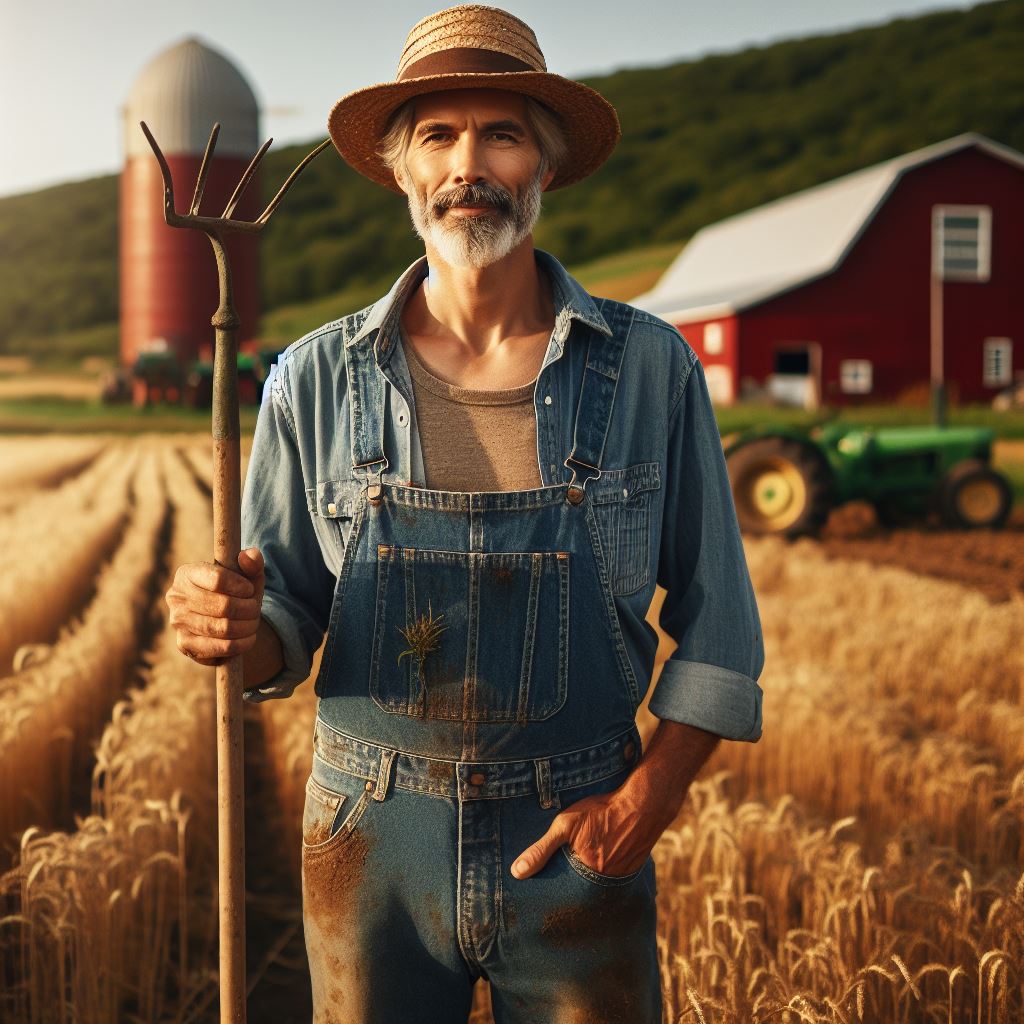Introduction
Farmers are the backbone of our food system, ensuring that we have access to high-quality and nutritious food. The importance of farmers and food quality cannot be understated.
Attention-grabbing statement about the importance of farmers and food quality
Without farmers, we would not have a sustainable and secure food supply chain. They work tirelessly to grow crops, raise livestock, and produce the food we rely on.
Brief overview of the changes expected in the farming industry by 2024
By 2024, the farming industry is expected to undergo significant changes to meet the growing demands of a rapidly expanding global population and to address environmental concerns.
Farming methods are becoming more innovative and sustainable, with a focus on minimizing chemical inputs and adopting organic practices.
This shift towards sustainable agriculture aims to ensure that our food is produced in a way that is environmentally friendly and promotes soil health.
Technology is playing a crucial role in transforming the farming industry. Farmers are adopting cutting-edge tools and techniques such as precision agriculture, drones, and data analytics to optimize crop yields and reduce waste.
There is also a growing emphasis on diversification in the farming sector. Farmers are exploring alternative crops and livestock, such as specialty vegetables and organic meat, to meet the changing consumer demands and tap into niche markets.
In addition, the concept of farm-to-table is gaining momentum, as consumers increasingly value locally sourced and organic produce.
Farmers are connecting directly with consumers through farmers’ markets, community-supported agriculture (CSA) programs, and online platforms.
Overall, the farming industry is evolving to ensure a sustainable and high-quality food supply for future generations. Farmers are at the forefront of these changes, embracing new methods and technologies to meet the challenges of tomorrow.
Current Challenges in Food Quality
Ensuring food quality is a significant challenge for farmers in today’s rapidly changing world. This blog section will discuss the current issues faced by farmers and the importance of addressing these challenges.
Current issues faced by farmers in ensuring food quality
Limited access to clean water affects irrigation, leading to lower crop quality and safety.
Pests and diseases pose a constant threat, forcing farmers to rely heavily on pesticides.
Lack of proper training and knowledge among farmers result in poor food handling practices.
Inadequate funding for research and development hampers innovation in food safety technologies.
Transform Your Agribusiness
Unlock your farm's potential with expert advice tailored to your needs. Get actionable steps that drive real results.
Get StartedClimate change brings extreme weather patterns, impacting crop yields and quality.
These challenges significantly impact farmers’ ability to maintain high food quality standards while meeting the growing demand for food.
Examples of food safety concerns and their impact on consumers
Outbreaks of foodborne illnesses, such as E.coli and Salmonella, have caused severe sickness and even death.
Presence of harmful pesticides and chemicals in food products leads to long-term health problems.
Contamination of food with allergens can trigger life-threatening allergic reactions in susceptible individuals
Improper handling and storage of food can promote the growth of bacteria, causing food spoilage and poisoning.
Fraudulent practices, like mislabeling and adulteration, deceive consumers and compromise their trust.
These food safety concerns not only affect individuals but also lead to public health crises and economic losses.
Significance of addressing these challenges
Addressing the challenges in food quality is crucial for several reasons:
- Protecting public health: Ensuring safe food minimizes the risk of foodborne illnesses, promoting the overall well-being of consumers.
- Promoting sustainable agriculture: Implementing sustainable practices safeguards the environment and preserves natural resources for future generations.
- Building consumer trust: Maintaining high food quality standards establishes trust between farmers, businesses, and consumers, ensuring long-term relationships.
- Meeting international standards: Adhering to global food safety standards enables access to international markets, fostering economic growth.
- Enhancing food security: Producing high-quality food helps meet the increasing demand for nourishment as the global population continues to grow.
Addressing these challenges requires collaborative efforts from various stakeholders, including farmers, government bodies, researchers, and consumers.
In summary, the current challenges in ensuring food quality pose significant obstacles for farmers. Issues such as limited access to clean water, pest control, and lack of knowledge must be addressed to maintain high standards.
Food safety concerns directly impact consumers and have broader consequences for public health and the economy.
By recognizing the significance of these challenges, we can work together to overcome them and achieve a future with safe, nutritious, and sustainable food for all.
Read: Impact of New FDA Food Guidelines
Technological Advancements in Agriculture
Over the past few decades, technological innovations have revolutionized the way farmers produce, manage, and distribute food. These advancements have not only transformed farming practices but have also significantly improved food quality.
Here, we will take a closer look at some of the major technological tools and devices that farmers are utilizing to achieve better food quality.
Overview of Technological Innovations
- Smart Farming: Today, farmers are embracing smart farming techniques that rely on sensors, drones, and artificial intelligence.
- Precision Agriculture: Precision agriculture employs GPS and satellite technology to optimize crop yields and reduce wastage.
- Vertical Farming: With the help of advanced systems for growing plants indoors, vertical farming allows for year-round production of high-quality crops.
- Aquaponics: Aquaponics combines aquaculture and hydroponics to create a sustainable and efficient method of farming.
- Robotics and Automation: Robotics and automation have made labor-intensive tasks more efficient, reducing human errors.
Examples of New Tools and Devices
- Remote Sensing: Remote sensing technologies help farmers monitor soil moisture, detect diseases, and evaluate crop health.
- Precision Planters and Harvesters: These devices allow farmers to plant and harvest crops more accurately, resulting in higher yields.
- Sensor-based Irrigation Systems: Sensors can measure soil moisture levels, ensuring optimized water usage and preventing over-irrigation.
- Autonomous Robots: Robots equipped with cameras and AI can navigate fields, identify and remove weeds, and detect plant diseases.
- Blockchain Technology: Blockchain can enhance transparency and traceability by recording and tracking every stage of the food supply chain.
Benefits of Technology in Increasing Efficiency and Reducing Risks
The implementation of technology in agriculture has brought numerous benefits, contributing to increased efficiency and reduced risks for farmers.
Higher Crop Yields
By utilizing precision agriculture tools and devices, farmers can optimize plant growth conditions, resulting in higher crop yields.
Improved Resource Management
Technological advancements enable farmers to monitor soil conditions, water usage, and nutrient levels, leading to more efficient resource management.
Reduced Waste
With sensor-based irrigation systems and precise planting methods, farmers can minimize water and fertilizer wastage, reducing environmental impact.
Enhanced Food Quality
Vertical farming and aquaponics systems ensure that crops are grown in optimal conditions, guaranteeing higher nutritional content and better food quality.
Disease and Pest Management
Technology allows for early detection of plant diseases and pest infestations, enabling farmers to take proactive measures and prevent crop losses.
Efficient Supply Chain
Blockchain technology facilitates transparent and secure supply chains, benefiting both farmers and consumers by ensuring traceability and authenticity.
Cost Savings
By automating tasks and using data-driven insights, farmers can reduce labor costs, minimize waste, and optimize resource allocation, resulting in overall cost savings.
Showcase Your Farming Business
Publish your professional farming services profile on our blog for a one-time fee of $200 and reach a dedicated audience of farmers and agribusiness owners.
Publish Your ProfileThe technological advancements in agriculture have paved the way for a more sustainable and efficient future. Farmers are utilizing a wide range of tools and devices to achieve better food quality, increase efficiency, and reduce risks.
The benefits of these technological innovations extend beyond the farm, contributing to a more secure and transparent food supply chain.
Embracing technology in agriculture is essential for meeting the demands of a growing population and ensuring a sustainable food future.
Read: 2024 USDA Food Safety Rules Explained

Sustainable Farming Practices
The growing importance of sustainability in agriculture
Sustainable farming practices play a crucial role in ensuring high-quality food production for the future.
As the demand for food continues to increase, it becomes imperative for farmers to adopt sustainable methods to meet this demand while also preserving our environment.
The growing importance of sustainability in agriculture cannot be understated.
It encompasses practices that aim to minimize negative impacts on the environment, maintain the long-term viability of farming, and ensure the well-being of farmers and consumers alike.
Sustainable farming methods and their positive impact on food quality
One of the key sustainable farming methods is crop rotation. This practice involves growing different crops in the same area over a sequence of seasons or years.
By doing so, farmers can mitigate soil erosion, reduce pests and diseases, and enhance nutrient availability. Crop rotation also helps break the cycle of crop-specific pests and diseases, leading to better overall crop health.
Another effective sustainable farming method is the use of cover crops. These are crops specifically grown to protect and improve the soil rather than for direct harvest.
Cover crops help prevent soil erosion, suppress weeds, enhance soil fertility, and increase organic matter content. By reducing the need for synthetic fertilizers and pesticides, cover crops contribute to better food quality and lower contamination risks.
Furthermore, precision agriculture has gained traction as an environmentally-friendly practice. It involves using technology, such as GPS and sensors, to tailor farming practices to specific field conditions.
By precisely applying inputs like water, fertilizers, and pesticides, farmers can minimize waste and optimize crop growth.
This approach reduces the environmental impact of agriculture and ensures optimal use of resources, ultimately leading to improved food quality.
In addition to these methods, sustainable farmers often prioritize the use of organic farming techniques. Organic farming prohibits the use of synthetic fertilizers, pesticides, and genetically modified organisms (GMOs).
Instead, it focuses on natural soil fertility management, biological pest control, and the use of organic inputs. Organic farming not only produces food free from harmful chemical residues but also promotes biodiversity and protects ecosystems.
Examples of environmentally friendly practices adopted by farmers
Farmers are also increasingly adopting agroforestry practices, which involve integrating trees or shrubs into agricultural systems. Agroforestry enhances soil fertility, conserves water, provides habitat for beneficial organisms, and sequesters carbon.
The presence of trees in and around farms can reduce the need for irrigation, prevent soil erosion, and improve overall ecosystem health, thereby positively impacting food quality.
It is encouraging to see many farmers embracing sustainable practices. For instance, some employ advanced irrigation techniques, such as drip irrigation or precision sprinklers, to minimize water usage and maximize water efficiency.
Others focus on reducing pesticide use by implementing integrated pest management strategies, utilizing natural predators, and utilizing pheromones or traps.
Furthermore, alternative energy sources are gaining momentum in agriculture. Many farmers are investing in solar panels or wind turbines to generate clean energy for their farms.
This not only reduces reliance on fossil fuels but also lowers greenhouse gas emissions, contributing to a healthier environment and better food quality.
To summarize, sustainable farming practices are crucial for ensuring food quality in the years to come.
Through methods like crop rotation, cover cropping, precision agriculture, organic farming, and agroforestry, farmers can mitigate environmental impacts, enhance soil health, improve resource efficiency, and protect biodiversity.
By embracing sustainable practices, farmers contribute to a resilient and sustainable food system that benefits both present and future generations.
Read: Farm Labor Laws: Changes in 2024 You Must Know
Shift towards Organic Farming
Increasing demand for organic food and its impact on farming
Organic farming is gaining immense popularity as consumers are becoming more conscious about the quality and safety of their food. The demand for organic food is steadily increasing, leading to significant changes in farming practices.
The increasing demand for organic food can be attributed to various factors. First and foremost, consumers are becoming more aware of the adverse effects of pesticides and synthetic fertilizers on their health.
They are seeking alternatives that ensure a healthier lifestyle.
One of the main advantages of organic farming is its minimal use of chemicals. Instead, organic farmers rely on natural methods like crop rotation, mulching, and biological pest control.
This not only helps in preserving the soil fertility but also contributes to the overall quality of the produce.
Organic farming practices and their contribution to food quality
Organic farming practices also focus on maintaining biodiversity. By avoiding chemical inputs, farmers create a favorable environment for beneficial insects, birds, and microorganisms.
These diverse ecosystems play a crucial role in maintaining a balance in the farm and preventing the outbreak of pests and diseases.
Examples of successful transitions to organic farming methods
Transitioning to organic farming methods requires careful planning and implementation. However, many farmers have successfully made the switch and are reaping the benefits.
One such example is Gabe Brown, a North Dakota farmer who transformed his conventional farm into a thriving organic operation.
Gabe Brown adopted practices like cover cropping, rotational grazing, and composting, which resulted in improved soil health and increased yields.
He now produces high-quality organic grains and vegetables while also improving the overall sustainability of his farm.
Another successful example is Polyface Farm in Virginia, owned by Joel Salatin. Salatin practices regenerative agriculture, which involves mimicking natural ecosystems to enhance soil fertility and biodiversity.
By implementing rotational grazing and composting, he has created a self-sustaining farm that produces nutrient-dense and flavorful organic meat.
Showcase Your Farming Business
Publish your professional farming services profile on our blog for a one-time fee of $200 and reach a dedicated audience of farmers and agribusiness owners.
Publish Your ProfileThe shift towards organic farming is not limited to small-scale operations. Large corporations and even countries are recognizing the importance of organic agriculture.
Denmark, for instance, aims to become 100% organic by 2020. The government supports farmers with subsidies and educational programs to encourage the transition.
In the end, the increasing demand for organic food is driving a significant shift towards organic farming practices. These practices prioritize sustainability, biodiversity, and soil health, resulting in high-quality produce.
Successful transitions to organic farming have already been witnessed, highlighting the potential for a future dominated by organic agriculture.
Read: The Future of GMOs: US Policies and Debates
Uncover the Details: Essential Tax Tips for New Farmers
Consumer Education and Awareness
Importance of educating consumers about food quality and farming practices
One of the most significant aspects of the future of farming and food quality in 2024 is the importance of consumer education and awareness.
With the continued rise of sustainable agriculture practices and the growing concern for food safety and nutrition, consumers need to be well-informed about the quality of the food they consume and the practices involved in its production.
Educating consumers about food quality and farming practices is crucial as it empowers them to make informed choices about the food they consume.
By understanding the various factors that contribute to food quality, consumers can actively seek out products that align with their values and preferences.
Role of labeling and certifications in informing consumers
Labeling and certifications play a pivotal role in informing consumers about the quality of the food they purchase. Clear and informative labels provide valuable information about the ingredients, sourcing, and production methods employed.
This transparency enables consumers to assess whether a product meets their desired standards, such as organic, non-GMO, or fair trade.
In addition to labels, certifications serve as credible markers of quality and responsibility.
Certification programs, such as the USDA Organic or Fairtrade International, evaluate and monitor producers to ensure they comply with specific standards and guidelines.
These certifications provide consumers with a level of trust and assurance that the product they are purchasing meets certain criteria for quality and ethical practices.
Examples of initiatives aimed at raising awareness and promoting informed food choices
Various initiatives have emerged to raise awareness and promote informed food choices to consumers.
For instance, non-profit organizations and advocacy groups organize educational campaigns that emphasize the importance of sustainable farming and highlight the adverse effects of certain farming practices on the environment and public health.
These initiatives often collaborate with farmers’ markets and local food cooperatives to connect consumers directly with producers.
This direct interaction allows consumers to learn about various farming practices, ask questions, and gain a deeper understanding of the food they are purchasing.
In the digital age, technology plays a crucial role in disseminating information and encouraging consumer education.
Online platforms and smartphone applications provide consumers with access to a wealth of information about specific products, including information about their nutritional content, origin, and environmental impact.
Furthermore, social media has become a powerful tool in raising awareness about food quality issues. Food bloggers, influencers, and organizations utilize platforms like Instagram and YouTube to share their knowledge and advocate for responsible food choices.
Such efforts have significantly contributed to the spread of information and the formation of conscious consumer communities.
In short, consumer education and awareness about food quality and farming practices are vital for the future of agriculture in 2024.
Labeling, certifications, and initiatives aimed at raising awareness all play essential roles in empowering consumers to make informed decisions and promoting sustainable and responsible food choices.
With a well-informed consumer base, the demand for high-quality, ethically-produced food will continue to rise, ultimately driving positive changes in the agricultural industry.
You Might Also Like: Agribusiness Tax Credits: An Overview
Government Regulations and Support
Government regulations and support play a crucial role in ensuring food safety and quality. They also help farmers adopt new practices to meet the evolving demands of consumers.
In this section, we will provide an overview of current and future government policies focused on food quality, as well as explain the importance of regulations and government support in the agriculture sector.
Overview of Current and Future Government Policies
Government policies pertaining to food quality are constantly evolving to keep up with changing consumer preferences and advancements in technology.
These policies aim to safeguard public health while promoting sustainable agriculture practices. Today, there is a growing emphasis on organic and locally sourced produce, as well as the reduction of chemical inputs in farming.
In the near future, we can expect stricter regulations surrounding labeling and transparency. Consumers are becoming increasingly concerned about the origin and production methods of their food, leading to calls for clearer labeling.
Governments are responding by implementing policies that require detailed information on packaging, such as country of origin, farming techniques used, and any additives or preservatives.
Moreover, governments are also focusing on reducing food waste through regulations. They encourage food producers and retailers to adopt measures to prevent spoilage and improve supply chain efficiency.
This includes incentivizing the donation of surplus food to charities and imposing penalties for excessive waste.
The Role of Regulations in Ensuring Food Safety and Quality
Regulations play a fundamental role in safeguarding the food supply chain. They establish guidelines and standards to ensure that food is safe for consumption and meets quality requirements.
These regulations cover various aspects, including farming practices, processing, storage, transport, and labeling.
By imposing regulations, governments can enforce proper hygiene practices in food establishments, implement regular inspections, and set maximum limits for contaminants and pesticide residues.
These measures help to detect and prevent the sale of unsafe or adulterated food products, protecting consumer health.
Furthermore, regulations facilitate traceability in the food industry. They require accurate record-keeping at each stage of the supply chain, enabling quick identification and recall of potentially hazardous products.
Showcase Your Farming Business
Publish your professional farming services profile on our blog for a one-time fee of $200 and reach a dedicated audience of farmers and agribusiness owners.
Publish Your ProfileThis ensures swift action in the event of a foodborne illness outbreak or contamination incident.
The Importance of Government Support for Farmers
Government support is crucial for farmers as they strive to adopt new practices that promote food quality and sustainability.
Implementing changes in farming techniques and transitioning to organic or less chemical-intensive methods can be costly and challenging for farmers.
Financial assistance in the form of subsidies or grants helps to offset the initial investment required for adopting new technologies and practices.
This support can cover the costs of equipment, training, and certification, making it more feasible for farmers to transition to sustainable methods without risking financial stability.
Additionally, government support can come in the form of research and development funding.
By investing in agricultural research, governments contribute to the development of innovative solutions that enhance food quality, improve yield, and reduce environmental impact.
This research can provide farmers with valuable knowledge and resources to implement sustainable farming practices successfully.
Moreover, governments can support farmers by promoting their produce domestically and internationally.
Hosting trade fairs, creating marketing campaigns, and fostering partnerships with retailers and distributors can help farmers access new markets and sell their high-quality produce at fair prices.
This support not only benefits farmers financially but also incentivizes them to continue prioritizing food safety and quality.
Government regulations and support are essential for ensuring food safety, quality, and sustainability. Current and future government policies focus on transparency, reduction of food waste, and the promotion of organic and locally sourced produce.
Regulations play a vital role in enforcing hygiene standards, traceability, and the prevention of unsafe food products. Government support, through financial assistance and research funding, helps farmers adopt new practices that align with consumer demands.
By collaborating with farmers, governments can secure the food supply chain and foster a healthier and more sustainable future for agriculture.
Conclusion
Recap of the key points discussed in the blog post
After discussing the key points in this blog post, it is clear that farmers play a vital role in ensuring food quality. Their efforts are essential in meeting the anticipated changes in farming and food quality by 2024.
As technology and environmental concerns continue to drive changes in farming, farmers must adapt and innovate. By implementing sustainable practices, embracing new technologies, and prioritizing food safety, they can meet the growing demands for quality food.
Emphasizing the significance of farmers’ efforts in ensuring food quality
It is important to recognize and appreciate the hard work and dedication of farmers in providing safe and nutritious food for consumers. Their commitment to sustainability and continuous improvement is commendable.
Final thoughts on the anticipated changes in farming and food quality by 2024
Overall, the anticipated changes in farming and food quality by 2024 are both challenging and promising. However, with the efforts of farmers and their focus on ensuring food quality, we can be confident in the future of our food system.




